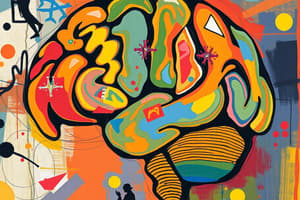Podcast
Questions and Answers
What is episodic memory commonly likened to in the context of time?
What is episodic memory commonly likened to in the context of time?
- A computer file
- A recording device
- A behavioral guide
- A time machine (correct)
What influences the process of reconstructing memories according to Bartlett?
What influences the process of reconstructing memories according to Bartlett?
- Emotional states
- Physical location
- Prior knowledge (correct)
- Age of the individual
What aspect of memory is chiefly studied by Ebbinghaus?
What aspect of memory is chiefly studied by Ebbinghaus?
- Memory of nonsense syllables (correct)
- Visual memory retention
- Emotional memory connections
- Memory of complex narratives
According to the learning curve, what happens as more trials are conducted?
According to the learning curve, what happens as more trials are conducted?
How are the conditions of learning described in the context of cognitive maps as demonstrated by Tolman's research on rats?
How are the conditions of learning described in the context of cognitive maps as demonstrated by Tolman's research on rats?
What does the term 'engram' refer to in the study of memory?
What does the term 'engram' refer to in the study of memory?
How is forgetting characterized in the context of learning?
How is forgetting characterized in the context of learning?
What is the main focus of behaviorism in the context of memory and learning?
What is the main focus of behaviorism in the context of memory and learning?
What is the primary function of practicing retrieval in memory recall?
What is the primary function of practicing retrieval in memory recall?
What does Miller's 'Magic #7' refer to in memory studies?
What does Miller's 'Magic #7' refer to in memory studies?
According to Tulving's triachic theory, which type of memory is associated with personal experiences?
According to Tulving's triachic theory, which type of memory is associated with personal experiences?
How does the concept of 'savings' relate to memory recall?
How does the concept of 'savings' relate to memory recall?
What role do sensory inputs play in memory storage, according to the content?
What role do sensory inputs play in memory storage, according to the content?
Which statement best describes implicit memory?
Which statement best describes implicit memory?
What happens to memory errors when neuronal connections are strengthened?
What happens to memory errors when neuronal connections are strengthened?
Which of the following best describes the process of encoding in memory?
Which of the following best describes the process of encoding in memory?
Flashcards are hidden until you start studying
Study Notes
Memory and its Functions
- Memory enables temporal "time travel," allowing individuals to reflect on the past, present, and future.
- Memories influence behavior, decisions, social structures, and cultural contexts.
- Episodic memory serves as a mechanism for recalling past experiences, impacting future actions.
- Learning is foundational for memory; without it, functioning as a person is compromised.
Memory Definitions and Theories
- Engram: A representation holding the contents of experiences; it is not a perfect replica, but a reconstructed memory.
- Memory processes include acquisition, storage, and retrieval; experiences shape how we remember.
- Bartlett emphasized that prior knowledge significantly influences memory reconstruction, leading to fragmented and sometimes incomplete recollections.
Key Figures in Memory Research
- Ebbinghaus: First to experiment scientifically with memory, using nonsense syllables and highlighting memory reconstruction influenced by prior experiences.
- Tolman: Demonstrated cognitive maps in rats, showcasing complex learning and adaptation in navigation tasks.
Memory Learning Curves and Forgetting
- Learning tends to occur quickly, followed by plateaus characterized by less progress.
- A typical learning curve is negatively accelerating, indicating that initial trials yield more significant learning outcomes.
- Forgetting occurs rapidly after initial learning, necessitating repeated practice for information retention.
Models and Theories of Memory
- The Modal Model describes memory systems where sensory input enters, undergoes processing, and interacts with long-term memory.
- Tulving's Triarchic Theory differentiates between types of long-term memory:
- Declarative (explicit): Knowledge conscious and easily articulated.
- Non-declarative (implicit): Unconscious actions, such as skills and habits, without awareness.
Memory Types
- Episodic Memory: Specific, personal experiences with conscious awareness of time and context.
- Semantic Memory: General knowledge not tied to specific events, less susceptible to rapid forgetting.
- Memory systems are interrelated and can be manipulated, influencing how information is stored and retrieved.
Neuroscience of Memory
- Research aims to locate the physical traces of memory (engram) in the brain, using lesions to investigate neural connections.
- Long-Term Potentiation (LTP): Strengthening of synaptic connections when neurons fire together, aiding memory formation and retrieval.
Capacity and Organization of Memory
- Short-term memory (STM) has a limited capacity, famously described by Miller as the "magic number 7."
- Organized information enhances memory retention; systematic reviewing aids the retention process.
Implications of Memory Research
- Memory systems evolve through interactions with our environment and experiences, remaining dynamic over time.
- Forgetting is a natural process, but with effective study and retrieval methods, previously forgotten information can be recalled efficiently.
Studying That Suits You
Use AI to generate personalized quizzes and flashcards to suit your learning preferences.




